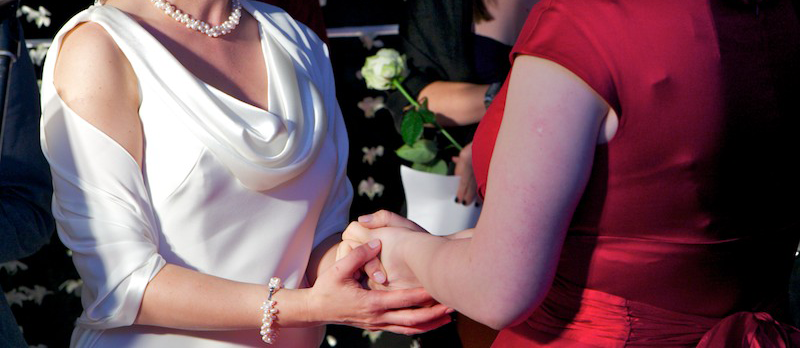Couples among the first to have legal same-sex weddings are still choosing to have an additional humanist ceremony to mark their special day.
The British Humanist Association (BHA) welcomes the the first ever same-sex marriages following the implementation of the Marriage (Same Sex Couples) Act. The BHA was a strong supporter of the Act, as well as of the work of the Coalition 4 Equal Marriage (C4EM) and the Equal Love Campaign, and has been conducting same-sex humanist wedding ceremonies for over 20 years, long before same-sex couples could have legally recognised marriages.
Committed humanist Peter McGraith and his partner David Cabreza became one of the first couples to marry under the new law, marrying in Islington Town Hall at the stroke of midnight on 29 March.
An amendment in last year’s Act seeks to make provision for legally binding humanist marriages in England and Wales, much like in Scotland, where 10% of all marriages now are humanist ones. Currently, humanist weddings in England and Wales have no legal force of their own, and couples are required to pay a visit to the registry office to make their marriages official.
But despite this, and the breakthrough that March 29th represents, same-sex couples are continuing to opt for a humanist wedding to seal their commitment to one another. Humanist ceremonies have the advantage of being individually tailored by the couple, meaning each ceremony is highly unique and personal to the couple making vows.
In fact, it seems that for many couples getting married, it is the uniquely personal and moving aspects of humanist ceremonies, which have the most appeal. ‘It was a big decision for us, as weddings cost an absolute fortune,’ comments Teresa Milward, who married Helen Brearley in Halifax on the morning of 29 March, ‘but I was really keen to have a humanist ceremony. My brother had one in Scotland and it was beautiful and personal. They got to say the words they wanted, and it was really special.’
Couples like Teresa and Helen are having humanist weddings all over the country, and BHA Head of Ceremonies Isabel Russo is confident that the pattern is meaningful.
‘It doesn’t surprise me that same-sex couples around the country are having humanist ceremonies, despite now having access to same-sex marriage,’ says Isabel. ‘And we’re expecting this will be a fairly regular occurrence. We’ve been providing same-sex weddings for so many years, and humanist weddings are already well recognised for being special, unique and sincere occasions for couples who have no religious conviction to affirm their love for one another. The registry office can’t make your wedding meaningful and memorable in the same way as a ceremony conducted by a trained humanist celebrant.
‘We are of course extremely proud to have played our part in what is a historic day for same-sex couples and for society as a whole. We hope that another inequality will soon also be addressed as we work towards legal recognition of humanist marriages.’
Notes
For further comment or information, please contact Isabel Russo on Isabel@humanists.uk
You can read more about humanist ceremonies in general at www.humanistceremonies.org.uk
Founded in 1896, the British Humanist Association represents, supports, and provides services to non-religious people living ethical on the basis of reason and humanity.
Over a million people in the UK attend a humanist funeral, wedding or naming each year. Our trained celebrants are awarded 5/5 by over 97% of families.
A humanist, non-religious wedding or partnership ceremony is the one which can truly mark a couple’s life-long commitment to each other. This ceremony is special to the couple and their guests, at which they make their vows and during which they may choose to exchange rings.
The LGBT section of the British Humanist Association is Galha, which has promoted humanism for over 30 years and campaigned for equality and diversity, particularly relating to sexual orientation and identity – both in the UK and internationally. For more information: http://www.galha.org/

